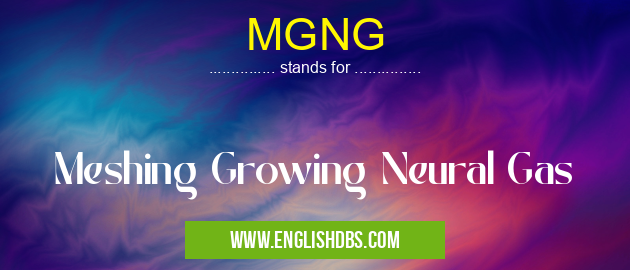What does MGNG mean in UNCLASSIFIED
MGNG (Meshing Growing Neural Gas) is an unsupervised, topology-preserving, and self-organizing neural network algorithm. It is a type of growing neural gas, which is a type of artificial neural network that can learn the distribution of a dataset and represent it in a low-dimensional space.

MGNG meaning in Unclassified in Miscellaneous
MGNG mostly used in an acronym Unclassified in Category Miscellaneous that means Meshing Growing Neural Gas
Shorthand: MGNG,
Full Form: Meshing Growing Neural Gas
For more information of "Meshing Growing Neural Gas", see the section below.
Functionality of MGNG
MGNG works by creating a network of neurons that are connected to each other. The neurons are initially placed randomly in the input space. As the algorithm learns, the neurons move closer to each other to form a network that represents the distribution of the data. The connections between the neurons are also updated to reflect the similarity between the data points.
Advantages of MGNG
MGNG has several advantages over other clustering algorithms. It is able to:
- Learn the distribution of data in a topology-preserving manner, meaning that the relationships between the data points are preserved in the low-dimensional representation.
- Handle large datasets efficiently, as it can grow and shrink the network as needed.
- Discover complex and nonlinear relationships in the data, making it suitable for a wide range of applications.
Applications of MGNG
MGNG has been used in a variety of applications, including:
- Data visualization: MGNG can be used to visualize high-dimensional data in a low-dimensional space, making it easier to understand the relationships between the data points.
- Clustering: MGNG can be used to cluster data into different groups, based on their similarity.
- Dimensionality reduction: MGNG can be used to reduce the dimensionality of data, making it easier to store and process.
- Anomaly detection: MGNG can be used to detect anomalies in data, as the anomalies will appear as points that are far from the rest of the network.
Essential Questions and Answers on Meshing Growing Neural Gas in "MISCELLANEOUS»UNFILED"
What is Meshing Growing Neural Gas (MGNG)?
MGNG is an unsupervised learning algorithm that combines the principles of Growing Neural Gas (GNG) and Self-Organizing Maps (SOMs) to create a self-organizing neural network. It consists of a set of interconnected nodes that adapt their positions and connections based on the input data, forming a mesh-like structure.
How does MGNG work?
MGNG operates in an iterative process:
- Initialization: Create initial nodes randomly distributed in the input space.
- Adaptation: For each new data point, find the closest node and its neighbors.
- Error Calculation: Calculate the error between the data point and each node.
- Node and Edge Adjustment: Update the positions and connections between nodes based on the error and a neighborhood function.
- Error Minimization: Repeat steps 2-4 until the error reaches a minimum.
What are the key characteristics of MGNG?
MGNG exhibits several prominent features:
- Manifold Learning: It preserves the topological structure of the input data, capturing its intrinsic dimensionality.
- Automatic Node Creation: New nodes are added dynamically to adapt to the complexity of the data, providing better representation.
- Smooth Interpolation: The mesh-like structure enables interpolation between nodes, providing smooth transitions across the data manifold.
What are the applications of MGNG?
MGNG has found applications in various domains, including:
- Data Visualization: Dimensionality reduction and visualization of complex data sets.
- Clustering: Identifying clusters and structures within data.
- Feature Extraction: Extracting relevant features from high-dimensional data.
- Pattern Recognition: Detecting and classifying patterns in data.
Final Words: MGNG is a powerful and versatile neural network algorithm that can be used for a variety of applications. It is able to learn the distribution of data in a topology-preserving manner, handle large datasets efficiently, and discover complex and nonlinear relationships in the data.
